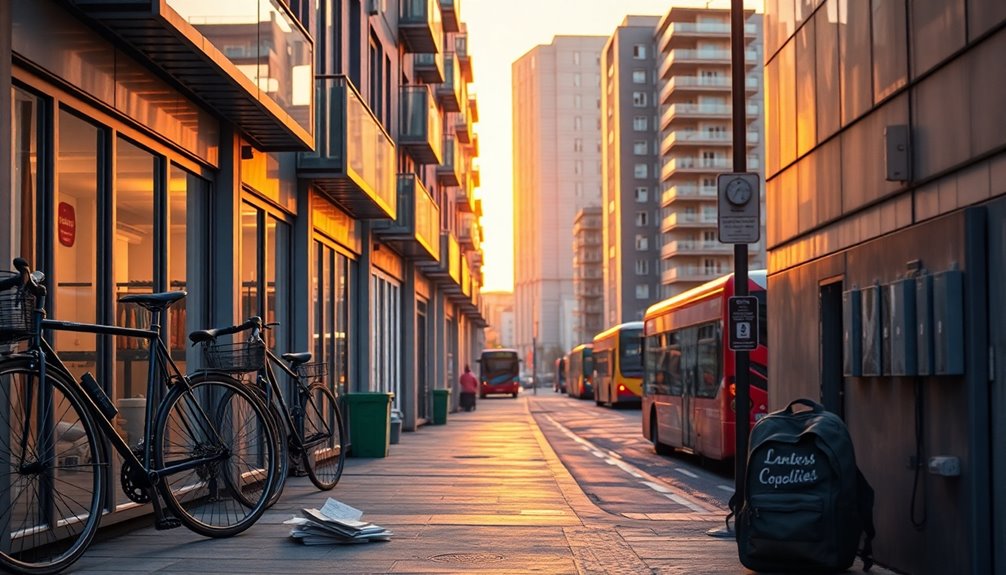
You’ll find seven common student housing types ranked by typical cost, bills-included, flexibility and lifestyle trade-offs so you can pick what suits you. Shared houses cut rent but need clear chores and quiet rules. Halls give on-campus convenience with varied contracts. Private apartments and studio flats offer independence; check utilities. Homestays include meals and support. PBSA bundles amenities and security. Commuter options save rent but add travel time and expense — keep going to see practical tips and numbers.
Shared Houses: Cost Breakdown and Prospects in Irish Cities
Though splitting a house can cut your rent dramatically, costs still vary a lot across Irish cities. You’ll find that location, transport links and local demand shape prices, so pick where you want to live, not where you feel stuck. Shared house dynamics matter: who’s tidy, who works nights, and how chores and bills get handled will reshape your daily freedom. Use clear cost sharing strategies—split utilities by usage, rotate grocery duties, and set a simple joint fund for communal items. Agree on quiet hours, visitors and cleaning to avoid clashes. This setup gives you flexibility and lower costs, letting you prioritize experiences and study without being chained to an unaffordable solo lease.
University Halls of Residence: Prices, Contracts and Value
When you compare university halls, you’ll see typical rents vary by city and room type, from budget shared rooms to pricier en-suite units. Pay attention to contract length essentials—term-only, academic year, or 51-week agreements each affect total cost and billing. Knowing both the weekly/monthly rate and the contract terms will help you judge overall value.
Typical Rent Ranges
You’ll usually find university halls priced to match location, room type and included bills, so expect a wide range—from basic shared rooms that cost much less to en-suite or studio options that carry a premium. You’ll want to balance rent affordability with the lifestyle you crave: cheaper rooms free up funds for travel and experiences, while pricier options give more privacy and convenience. Regional variations matter — city centres and popular campuses push prices up, smaller towns tend to be gentler on your wallet. Look for value, not just lowest cost, and think about what flexibility you need for your semester.
- Shared room: lowest rent, social atmosphere, basic facilities
- Standard single: mid-range, good balance of cost and comfort
- En-suite: higher rent, private bathroom, more independence
- Studio: premium, self-contained, greatest freedom
Contract Length Essentials
Because most university halls lock you into fixed-term agreements, understanding contract length is one of the first things you should do before signing — it affects total cost, your ability to leave early, and what happens over holidays. You’ll want to compare contract types and the lease duration so you’re not tied to a place that limits your plans. Look for break clauses, short-term options, and clearly stated holiday arrangements. If freedom matters, prioritize flexible terms or halls that allow subletting. Ask about penalties for early exit and whether rent pauses over breaks. Below is a quick snapshot to compare common options:
| Contract Type | Typical Lease Duration |
|---|---|
| Academic term | 9 months |
| Year-round | 12 months |
| Short stay | 6–8 weeks |
Private Student Apartments: Monthly Rates and What’s Included
When you shop for private student apartments, expect monthly rents to vary widely depending on location and size — from budget studios to pricier multi-bedroom units. Check whether utilities like electricity, water, heating, and internet are included or billed separately, since that can change your overall cost a lot. Also note which amenities (laundry, furnishings, gym, or cleaning) are part of the package so you can compare true value across options.
Typical Rent Ranges
Rent for private student apartments typically falls within a broad range—often from modest studios at the low end to larger multi-bedroom units at the high end—depending on location, amenities, and lease length. You’ll want to know average rental prices and regional cost differences so you can choose where freedom and budget meet. Urban centers push rates up; college towns or suburbs often give better value. Shorter leases or furnished units usually cost more per month, while longer commitments can lower your rate. Consider what you truly need before signing.
- City-center studios: higher rent, walkable lifestyle, quick access to campus
- Shared two-bedroom units: split costs, more privacy than dorms
- Suburban one-bedrooms: lower rent, quieter space
- Luxury complexes: premium amenities, pricier monthly rates
Utilities and Bills
Although utilities can seem like small add‑ons, they often make up a significant slice of your monthly housing cost, so you’ll want a clear sense of what’s included and what you’ll pay separately. You’ll look for leases that list electricity, water, heating, and internet; some places bundle them, others expect proactive utility management from you. If you value freedom, pick setups that let you control usage and switch providers. Bill sharing with roommates can lower costs, but agree on a fair system and document it to avoid disputes. Track monthly usage, set limits, and keep receipts. Compare apartments by total monthly outlay, not just rent, to keep your budget flexible and your lifestyle independent.
| Item | Included? | Typical Cost |
|---|---|---|
| Electricity | Often separate | $30–80 |
| Internet | Sometimes included | $20–50 |
| Water/Heat | Sometimes included | $10–60 |
Included Amenities
Beyond utilities, you’ll also want to know which building amenities are bundled into the monthly rate and which will cost extra. You’ll want freedom to budget and live how you like, so check whether included utilities cover internet, water, or power and whether included services like cleaning or package handling are part of the deal. Some complexes advertise “all-inclusive” but tack on fees for premium perks.
- Fitness center access and pool: free or premium?
- High-speed internet: included utilities or add-on?
- Laundry and maintenance: included services or pay-per-use?
- Common spaces and events: complimentary or subscription?
Ask for a clear list from management, compare totals, and pick the apartment that gives you the most autonomy without hidden costs.
Homestay Options: Typical Fees and Cultural Considerations
If you choose a homestay, you’ll often pay a weekly or monthly fee that covers your room, some meals, and basic utilities, with prices varying by city, host family amenities, and whether you opt for private or shared arrangements. You’ll enjoy homestay benefits like steady support and cultural immersion that help you practice language and local routines without committing to long leases. Expect clear rules about guests, chores, and quiet hours; these protect both your freedom and the household harmony. Ask about meal frequency, laundry, internet speed, and transportation links to avoid surprises. Negotiate payment terms, notice periods, and what’s included so you retain mobility. Homestays suit you if you value affordable structure and authentic local connections.
Studio Flats: Affordability vs. Independence Across Ireland

Many students find studio flats strike a clear balance between affordability and independence, offering a private living space with a kitchenette and bathroom for roughly the same cost as a single room in shared housing in smaller Irish cities. You’ll enjoy compact studio features that put you in control—your own cooking, study zone, and peace without flatmate compromises. Location advantages matter: rents vary widely between city centre, suburb and college-adjacent streets, so pick where convenience meets budget. Maintenance and bills are often simpler, and short leases give flexibility if you move each year. Consider these factors to decide if a studio supports your lifestyle and spending plan.
- Privacy vs. cost trade-offs
- Proximity to campus and transport
- Utilities and bill inclusion
- Lease length and exit flexibility
Purpose-Built Student Accommodation (PBSA): Costs and Amenities
Done. You’ll find PBSA gives structure without trapping you—private rooms, shared kitchens, social spaces and security designed for student life. Use an amenities comparison to weigh what matters: study pods, gyms, laundry, bike storage, and communal events can boost wellbeing and save time. A clear cost analysis helps you spot value: rent often includes bills and Wi‑Fi, so compare total monthly outlay versus independent options. Look for flexible lease lengths and refundable deposits if you crave freedom to move. Inspect contract clauses on guests and noise so your independence isn’t restricted unexpectedly. Visit during term to gauge atmosphere, and prioritize the features that let you balance study, social life and mobility without unnecessary expense.
Travel-Linked Savings: Commuter Accommodation and Transport Trade-offs
While choosing accommodation, think beyond monthly rent—commuting costs, time and convenience can swing your overall budget and wellbeing. You’ll weigh commuter savings against lifestyle: living farther may cut rent but add transit fares, longer days, and less spontaneity. Prioritize transport efficiency if you value time; aim for reliable routes, bike lanes, or affordable passes. Balance freedom and cost by mapping travel time to key spots—campus, shops, nightlife—and choose what trade-offs you’ll accept.
- Compare total monthly costs: rent plus transit passes, fuel, or rideshares.
- Check peak vs off-peak schedules to maximize transport efficiency.
- Consider flexible work or class schedules to reduce travel.
- Factor quiet, safe routes for late-night freedom and reduced ride costs.
Some Questions Answered
How Do Student Accommodation Costs Vary During Summer Months?
Of course prices drop magically — they often don’t. You’ll see summer pricing fluctuate with seasonal demand: some places cut rates, others hike for short-term stays, so you’ll shop, negotiate, and choose freedom over paying too much.
Can International Students Access Housing-Specific Scholarships?
Yes — you can often find housing scholarships aimed at international students; check university aid offices, international student services, and external foundations, and apply early, stay flexible, and negotiate for freedom-friendly options that fit your lifestyle and budget.
What Legal Protections Do Tenants Under 18 Have?
You still have tenant rights even if you’re under 18: you can’t be unlawfully evicted, deserve safe housing, and may sign or be bound by lease agreements with guardian consent—so know your rights and assert your freedom.
How Do Utility Billing Disputes Get Resolved?
Utility billing disputes get resolved through negotiation, documentation, and formal complaint channels. You’ll gather bills, argue calmly, escalate to regulators or mediation, and use dispute resolution steps to win fair billing adjustments and reclaim your freedom.
Are Short-Term Sublets Commonly Allowed in Student Contracts?
Usually you’re not automatically allowed; short term leases and contract clauses often restrict sublets, requiring landlord permission or specific terms. You’ll want to negotiate flexible clauses, document approvals, and keep communication open to preserve your freedom.
